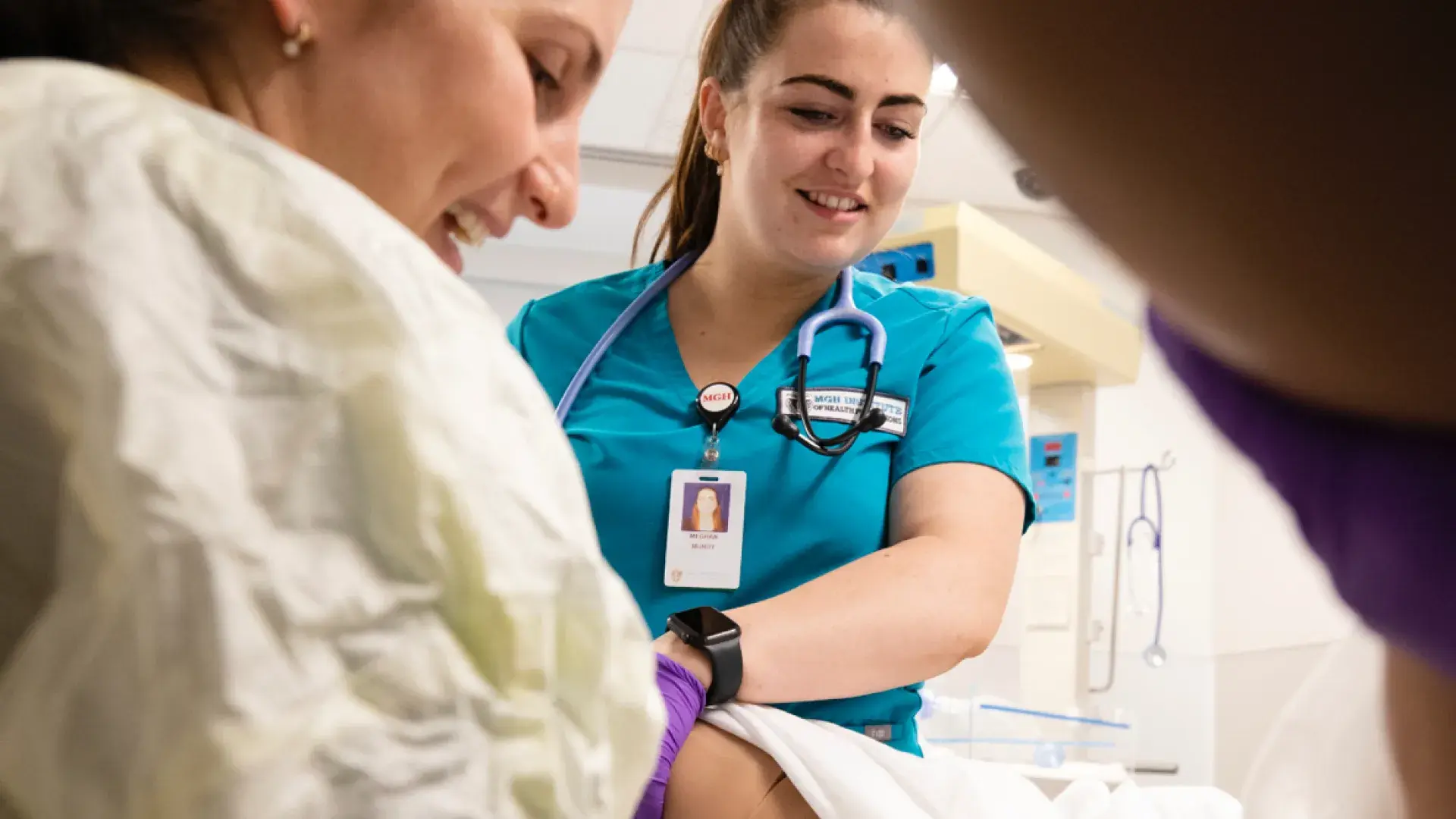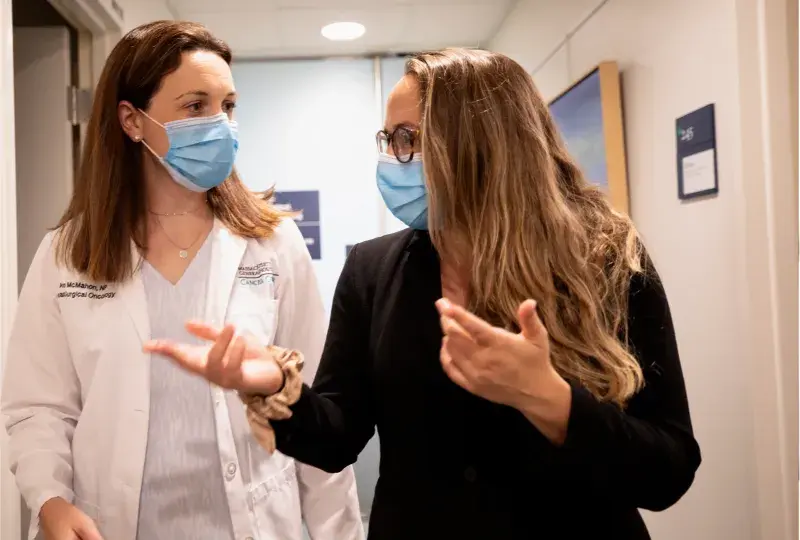
High demand, high rewards
Get the satisfaction of knowing you're assisting individuals with their most valued treasure: their health. With nursing demand on the rise, you can enjoy job security and flexibility as you guide people towards wellness.

Get the satisfaction of knowing you're assisting individuals with their most valued treasure: their health. With nursing demand on the rise, you can enjoy job security and flexibility as you guide people towards wellness.
Advanced practice nurse (APN) is an umbrella term that refers to registered nurses prepared at the master's level or higher with specialized education. An APN can be a nurse practitioner, nurse anesthetist, or nurse midwife. APNs can deliver as much as 80% of the primary and preventative health care services traditionally provided by primary care physicians, including having prescription privileges in all 50 states and the District of Columbia.
Possessing an in-depth knowledge of one or more specialty areas, APNs care for patients in a variety of settings that include acute care, critical care, intermediate care, long-term care, ambulatory care, and home care.
Two-thirds of all APNs are NPs, most of whom hold a Master's degree. NPs are well trained at examining patients, ordering and interpreting diagnostic studies, diagnosing and treating disease, as well as working in research and case management roles. An advanced practice nurse still gives all of the time and attention that they can to a patient, but will have more training to handle more complicated issues.
Most advanced practice nurses work in well-lighted, comfortable health care facilities. Advanced practice nurses work in hospitals, physicians' offices, home care settings, nursing homes for the elderly, occupational settings, and public health settings (schools, government and private agencies, clinics, and retirement communities).
Many nurses say they chose nursing in part because of the scheduling flexibility that enables them both to pursue a career and have a family.
In settings that require round-the-clock care, nurses are needed to work days, evenings and nights. The profession can be physically and emotionally demanding, depending on the environment.
The first three semesters of the MGH Institute School of Nursing Direct-Entry Master of Science program prepare you to take the National Council Licensure Examination (NCLEX-RN), which you must pass to become licensed and to work as a registered nurse (RN). Licensing is done by state boards of nursing. RNs are required to renew their licenses on a periodic basis.
Year | IHP Direct Entry (Total Graduates) | National Pass Rate |
|---|---|---|
2023 | 99% (88) | 89% |
2022 | 88% (92) | 80% |
2021 | 90% (95) | 82% |
2020 | 88% (91) | 88% |
There is no advanced practice licensure examination that parallels the NCLEX-RN. The National Council of State Boards of Nursing (NCSBN) recommends the use of APN certification examinations as a basis for state licensure and board certification decisions.
In the U.S., nurse practitioners are licensed by the state in which they practice, and have national certification through the American Nurses Credentialing Center (ANCC). Nurse practitioners also have national certification through the American Academy of Nurse Practitioners (AANP); and for nurse practitioners in Women's Health, through the National Certification Corporation (NCC).
After completing your advanced practice course of study in the Direct-Entry Master of Science, you are prepared to take the certification examination for your chosen specialty as a nurse practitioner. Read more about the difference between licensure and certification.
As an advanced practice nurse you are required to renew both your registered nurse's license and your advanced practice nursing specialty certification with state boards on a regular basis. Each state has its own authorization process for advanced practice nurses – see those for Massachusetts as an example.
Due to the continuing nursing shortage in the U.S., registered nurses are in great demand. According to US News & World Report, Employment of registered nurses is expected to grow 19.4 percent from 2012 to 2022, much faster than the average for all occupations. US News & World Report ranked RNs as having the sixth best job in America.
In addition, your BSN educational preparation affects patient care and your status as an RN. Research demonstrates that baccalaureate-prepared nurses deliver better patient care and improve patients' outcomes. Increasingly, employers recognize the importance of such research and seek to hire RNs with a minimum of a BSN degree.
Nurses work in all types of settings where there is a need for health care in communities, cities, and rural areas locally and globally, such as hospitals, community agencies, ambulatory care offices, home care settings, nursing homes, occupational settings, schools, public health clinics, veterans organizations, and government agencies.
In 12 months, the ABSN prepares you to take the National Council Licensure Examination (NCLEX-RN), which you must pass to become licensed and to work as a registered nurse (RN). Licensing is done by state boards of nursing. RNs are required to renew their licenses on a periodic basis.
Year | IHP ABSN (Total Graduates) | National Pass Rate |
|---|---|---|
2023 | 93% (126) | 89% |
2022 | 87% (188) | 80% |
2021 | 87% (171) | 82% |
2020 | 94% (188) | 88% |
Due to the continuing nursing shortage in the U.S., registered nurses are in great demand. All advanced practice specialties will be in high demand, particularly in medically underserved areas such as inner cities and rural areas. Growth will occur because of several factors, including healthcare legislation and the resulting newly insured, an increased emphasis on preventative care, and the large, aging baby-boom population will contribute to this demand.
Median annual earnings for nurse practitioners is 98k
Median annual earnings of registered nurses are $67k
US News & World Report ranked NPs as the 6th best job

Personalized Career Coaching
IHP's Center for Career & Professional Development (CCPD) helps you secure professional roles in the health professions.
With a resource section on nursing shortages
Career information, news about nursing, job search, and more
Very comprehensive guide to nursing education and nursing career information
International Honors Society for Nursing: Great source for leadership opportunities; an excellent Career Map for new and current nurses.
Through a combination of programs, including an educational loan repayment program, and a scholarship program, NHSC deploys a cadre of primary care clinicians who are motivated by an extraordinary desire to serve, along with a commitment to improve the health of underserved communities.
Your Nursing Career Begins Here.